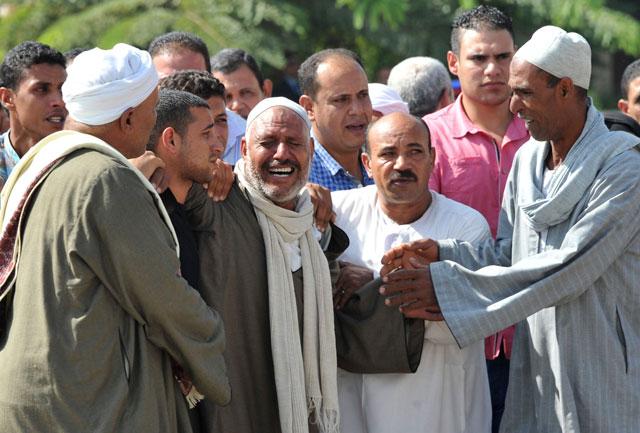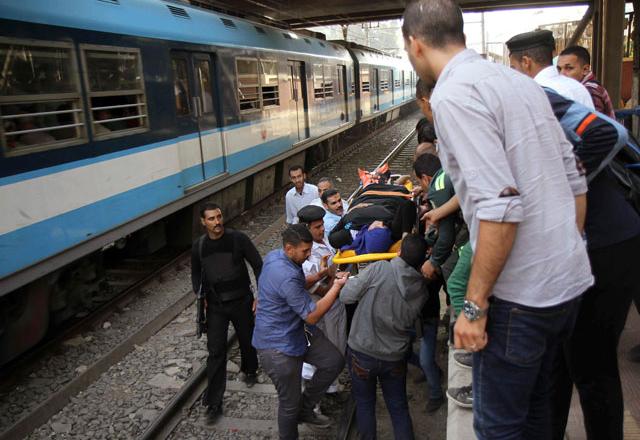You are here
Emergency rule in Egypt’s Sinai after bomb kills 30 troops
By AFP - Oct 25,2014 - Last updated at Oct 25,2014

CAIRO — A state of emergency came into force Saturday across much of Egypt’s Sinai Peninsula after 30 soldiers were killed in a suicide car bombing by suspected jihadists.
It was the deadliest attack on the country’s security forces since the army deposed Islamist president Mohamed Morsi last year, to the fury of his supporters.
The state of emergency, which took effect from 0300 GMT in the north and centre of the Sinai, will remain in place for three months, the president’s office said.
A curfew is in force from 5pm to 7am.
Egypt also announced it would close the Rafah crossing into the Gaza Strip, the only route into the Palestinian territory not controlled by Israel.
“The army and the police will take all necessary measures to tackle the dangers of terrorism and its financing, to preserve the security of the region... and protect the lives of citizens,” the presidential decree said.
The Supreme Council of the Armed Forces was due to meet on Saturday to decide what measures to implement under the state of emergency.
The bombing on Friday was carried out by a suspected jihadist who rammed a checkpoint with his explosives-packed vehicle, security officials said.
The attack, in an agricultural area northwest of El Arish, the main town in north Sinai, also left 29 other soldiers wounded, medics said.
A senior army official and five officers were said to be among those wounded.
Gunmen also shot dead an officer and wounded two soldiers on Friday at another checkpoint south of El Arish, security officials said.
Jihadists in the peninsula have killed scores of policemen and soldiers since Morsi’s overthrow to avenge a bloody police crackdown on his supporters.
Tourism hit
The attacks have dealt a further blow to a tourism industry already reeling after a 2011 uprising that overthrew long-time president Hosni Mubarak.
While south Sinai is dotted with tourist resorts on the Red Sea — a popular destination for scuba divers — the lawless north is a base for militants who have launched a wave of attacks, mostly targeting security forces.
The peninsula’s southern coastline has been largely spared from the violence rocking the country since the 2011 revolt, partly thanks to security checkpoints in the region.
But it has not been completely untouched by the militants.
In February, a suicide bomber killed three South Korean tourists in an attack on a bus in the south Sinai resort of Taba that was claimed by Ansar Beit Al Maqdis, the most active militant group in Egypt.
President Abdel Fattah Al Sisi, the army chief who toppled Morsi and later won elections, has pledged to eradicate the jihadists.
After Friday’s attack, Sisi announced three days of national mourning and summoned a meeting of the national defence council — the country’s highest security body — to discuss the killings, his office said.
International condemnation
The European Union and United States both denounced the attack.
“A prosperous and dynamic Egypt requires an environment of security and stability,” the State Department said.
It was the latest in a string of bloody attacks against security forces in Egypt.
In August 2013, just weeks after the army ousted Morsi, 25 soldiers were killed in the Sinai when gunmen opened fire at two buses transporting troops with automatic rifles and rocket launchers.
In July this year, 22 border guards were killed in the western desert near the border with Libya.
From the desert and mountainous Sinai, which borders the Gaza Strip and Israel, the attacks have also extended to the capital and the Nile Delta to the north.
Ansar Beit Al Maqdis tried to assassinate the interior minister in Cairo last year with a car bomb.
The group has expressed support for Islamic State (IS) group jihadists in Iraq and Syria, although it has not formally pledged its allegiance.
While militants have been killed or arrested, the army has been unable so far to crush them despite a massive operation in which it has deployed attack helicopters and tanks.
The latest bombing came after an Egyptian military court sentenced to death seven members of Ansar Beit Al Maqdis on Tuesday for deadly attacks on the army.
Since Morsi’s ouster, more than 1,400 of his supporters have been killed in a crackdown by the authorities.
Over 15,000 others have been jailed, including Morsi and the top leadership of his Muslim Brotherhood, and more than 200 sentenced to death in speedy trials.
Related Articles
A roadside bomb killed seven Egyptian soldiers and wounded four in the restive Sinai Peninsula on Sunday, security officials said.
Militants shot dead five Egyptian conscripts in the Sinai Peninsula on Thursday, as the army searched for eight servicemen missing after an attack on a navy boat in the Mediterranean.
Jihadists in Egypt's Sinai killed 15 soldiers and two civilians in attacks on checkpoints on Thursday, security officials said, the deadliest in months despite a massive army campaign against the insurgents.















